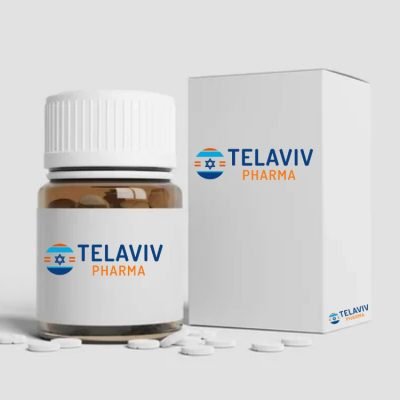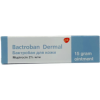- FREE SHIPPING! on orders over $95*
No products in the cart.
Return To Shop
Hepazec
$172.00
Hepazec contains rifaximin, a semi-synthetic non-systemic antibiotic specifically designed for gastrointestinal conditions. This unique medication works locally in the intestines without entering the bloodstream, making it highly effective for treating traveler’s diarrhea, hepatic encephalopathy, and irritable bowel syndrome with diarrhea. For patients seeking affordable gastrointestinal medications, working with qualified healthcare providers ensures proper diagnosis, appropriate monitoring, and access to authentic treatments with proper safety oversight for managing complex digestive and liver-related conditions effectively.
- Prescription Required
- Please note all prices are in US dollars
Hepazec (Rifaximin) – Complete Product Information
Hepazec Film-coated Tablet contains rifaximin, a semi-synthetic, non-systemic antibiotic based on rifamycin that represents a breakthrough in gastrointestinal medicine. Unlike conventional antibiotics that enter the bloodstream, rifaximin works exclusively within the intestinal tract, providing targeted therapy for specific gastrointestinal and hepatic conditions without causing systemic side effects.
The medication’s unique mechanism involves inhibiting RNA synthesis in susceptible bacteria by binding to the beta subunit of bacterial DNA-dependent RNA polymerase enzyme. This binding blocks translocation and stops transcription, preventing bacteria from producing essential proteins needed for reproduction. This targeted action makes rifaximin particularly effective against pathogenic bacteria in the gut while minimizing disruption to beneficial bacteria.
Rifaximin’s non-systemic nature means that less than 0.4% of the drug is absorbed into the bloodstream, with the vast majority remaining in the intestinal tract where it exerts its therapeutic effects. This localized action explains why the medication has an excellent safety profile with minimal systemic side effects, making it suitable for patients who cannot tolerate conventional antibiotics.
The medication is available in film-coated tablets containing 200mg or 550mg of rifaximin, allowing for flexible dosing based on the specific condition being treated. The film coating protects the active ingredient and ensures proper release in the intestinal tract for optimal therapeutic effect.
Hepazec (Rifaximin) Clinical Applications and Effectiveness:
Rifaximin has demonstrated significant efficacy in treating multiple gastrointestinal conditions. For traveler’s diarrhea caused by non-invasive strains of E. coli, the medication typically provides relief within 24-48 hours. In hepatic encephalopathy management, rifaximin helps reduce ammonia-producing bacteria in the gut, preventing the neurological complications associated with liver dysfunction.
For patients with digestive health conditions, rifaximin offers a unique therapeutic approach that addresses bacterial overgrowth and inflammation in the small intestine. The medication has shown particular benefit in treating irritable bowel syndrome with diarrhea (IBS-D), where it helps normalize gut bacteria and reduce symptoms like abdominal pain, bloating, and diarrhea.
Hepazec (Rifaximin) Important Safety Considerations:
While rifaximin has an excellent safety profile due to its minimal systemic absorption, patients should complete the full course of treatment as prescribed. The medication should not be used for systemic infections or conditions requiring systemic antibiotic therapy. Patients with severe liver disease require careful monitoring, as the medication’s effectiveness in hepatic encephalopathy depends on proper liver function assessment.
Recent research has highlighted rifaximin’s role in managing small intestinal bacterial overgrowth (SIBO) and its potential benefits in inflammatory bowel conditions. The medication’s anti-inflammatory properties, beyond its antibiotic effects, contribute to its therapeutic benefits in various gastrointestinal disorders.
For patients managing multiple gastrointestinal conditions, coordination with gastroenterologists experienced in complex digestive disorders is essential. Those taking other antibiotic medications need careful timing to prevent interference with rifaximin’s effectiveness. Patients exploring affordable digestive health treatment options should work with qualified healthcare providers to ensure proper diagnosis, treatment selection, and ongoing monitoring for both therapeutic effectiveness and potential complications.
| Brand | Hepazec brand |
|---|---|
| Form | 550 mg |
Rifaximin has one of the most favorable side effect profiles among antibiotics due to its minimal systemic absorption. Most patients tolerate the medication well, with side effects being generally mild and temporary.
Very Common Side Effects (≥10% of patients):
- Flatulence (gas): Most frequently reported side effect, usually mild and transient
- Abdominal pain: Mild to moderate discomfort, typically improves with continued treatment
Common Side Effects (1-10% of patients):
- Headache: Usually mild and self-limiting
- Nausea: Generally mild and occurs early in treatment
- Dizziness: Mild lightheadedness, usually temporary
- Fatigue: General tiredness or weakness
- Constipation: May occur as bowel habits normalize
- Vomiting: Usually mild and infrequent
- Abdominal distension: Bloating sensation
- Rectal tenesmus: Feeling of incomplete bowel evacuation
Uncommon Side Effects (0.1-1% of patients):
- Fever: Low-grade temperature elevation
- Rash: Mild skin reactions
- Urticaria (hives): Allergic skin reaction
- Pruritus (itching): Skin irritation
- Arthralgia: Joint pain or stiffness
- Muscle spasms: Temporary muscle contractions
- Dyspepsia: Indigestion or upset stomach
- Anorexia: Decreased appetite
Rare Side Effects (0.01-0.1% of patients):
- Clostridium difficile-associated diarrhea (CDAD): Serious but rare complication
- Severe allergic reactions: Including angioedema
- Severe abdominal pain: May indicate complications
- Blood in stool: Requires immediate medical attention
- Dehydration: From persistent diarrhea
Hepatic Encephalopathy Treatment - Specific Considerations:
- Ascites: Fluid accumulation in abdomen
- Peripheral edema: Swelling in legs and ankles
- Confusion: May indicate worsening liver condition
- Sleep disturbances: Related to underlying liver condition
- Depression: Associated with chronic liver disease
Serious Side Effects Requiring Immediate Attention:
- Severe persistent diarrhea: Especially with blood or mucus
- Severe abdominal cramping: May indicate complications
- Signs of severe dehydration: Dizziness, dry mouth, decreased urination
- Severe allergic reactions: Difficulty breathing, swelling of face/throat
- Fever with severe abdominal pain: May indicate serious infection
C. difficile-Associated Diarrhea (CDAD) Warning:
- Risk factors: Previous antibiotic use, hospitalization, advanced age
- Symptoms: Severe watery diarrhea, abdominal pain, fever
- Onset: Can occur during treatment or weeks after completion
- Severity: Can range from mild to life-threatening colitis
- Management: Discontinue rifaximin, start specific CDAD treatment
Drug Resistance Considerations:
- Potential for resistance development: Possible with prolonged or repeated use
- Cross-resistance: May occur with other rifamycin antibiotics
- Monitoring: Watch for reduced effectiveness in repeat treatments
Special Population Side Effects:
- Elderly Patients: Generally well-tolerated but monitor for dehydration
- Liver Disease Patients: Monitor for worsening hepatic function
- Kidney Disease: Usually well-tolerated due to minimal systemic absorption
- Pregnancy: Limited data available, use only if clearly needed
Laboratory Abnormalities:
- Elevated liver enzymes: Usually mild and reversible
- Changes in blood counts: Rare but possible
- Electrolyte imbalances: May occur with severe diarrhea
Monitoring Requirements:
- Symptom improvement: Most conditions should improve within 48-72 hours
- Hydration status: Monitor fluid intake and output
- Liver function: In patients with hepatic encephalopathy
- Treatment response: Assess effectiveness and adjust if needed
Important Safety Note: While rifaximin is generally very safe due to minimal systemic absorption, patients should complete the full prescribed course even if symptoms improve. Stopping treatment early can lead to symptom recurrence or contribute to antibiotic resistance.
Emergency Warning Signs: Seek immediate medical attention for severe persistent diarrhea with blood, signs of severe dehydration, severe abdominal pain with fever, or any signs of serious allergic reactions.
Hepazec (rifaximin) has specific approved indications where its unique non-systemic properties provide optimal therapeutic benefits:
Primary Indications:
Traveler's Diarrhea:
- Causative organisms: Non-invasive strains of Escherichia coli
- Patient population: Adults and children 12 years and older
- Treatment duration: Typically 3 days
- Effectiveness: 70-80% clinical cure rate within 72 hours
- Dosing: 200mg three times daily for 3 days
Hepatic Encephalopathy Prevention:
- Indication: Reduction in risk of overt hepatic encephalopathy recurrence
- Patient population: Adults with a history of hepatic encephalopathy
- Mechanism: Reduces ammonia-producing bacteria in the gut
- Treatment duration: Long-term maintenance therapy
- Dosing: 550mg twice daily
Irritable Bowel Syndrome with Diarrhea (IBS-D):
- Indication: Treatment of IBS-D in adults
- Symptom targets: Abdominal pain, bloating, diarrhea
- Treatment approach: Cyclical therapy for symptom flares
- Duration: 14-day courses, may repeat up to twice
- Dosing: 550mg three times daily for 14 days
Off-Label Uses (with medical supervision):
Small Intestinal Bacterial Overgrowth (SIBO):
- Hydrogen-positive SIBO: Particularly effective for hydrogen-producing bacteria
- Methane-positive SIBO: May be combined with other antimicrobials
- Treatment duration: Typically 14 days
- Success rates: 60-80% bacterial eradication
Inflammatory Bowel Disease (IBD) Maintenance:
- Crohn's disease: May help maintain remission in select patients
- Ulcerative colitis: Limited evidence for maintenance therapy
- Pouchitis: Prevention and treatment after ileal pouch surgery
Diverticular Disease:
- Uncomplicated diverticulitis: Alternative to systemic antibiotics
- Diverticular disease maintenance: Symptom prevention
- Dosing: Variable based on condition severity
Clinical Study Evidence:
Traveler's Diarrhea Studies:
- Clinical cure rates: 71-77% vs 32-44% placebo
- Time to relief: Median 32 hours vs 60 hours placebo
- Bacterial eradication: 80-85% E. coli elimination
- Safety profile: Similar to placebo in side effects
Hepatic Encephalopathy Studies:
- Recurrence reduction: 58% relative risk reduction
- Time to first episode: Significantly prolonged vs lactulose alone
- Hospitalization reduction: 50% reduction in HE-related admissions
- Quality of life: Improved cognitive function scores
IBS-D Studies:
- Symptom relief: 41% vs 32% placebo responder rate
- Abdominal pain: Significant reduction in pain scores
- Stool consistency: Improved Bristol stool scale scores
- Bloating relief: Sustained improvement up to 10 weeks
Dosing Guidelines by Indication:
Standard Dosing Regimens:
- Traveler's Diarrhea: 200mg PO TID × 3 days
- Hepatic Encephalopathy: 550mg PO BID (maintenance)
- IBS-D: 550mg PO TID × 14 days
- SIBO: 400mg PO TID × 14 days (off-label)
Special Dosing Considerations:
- Renal impairment: No dose adjustment required
- Hepatic impairment: Use with caution, monitor closely
- Elderly patients: No specific dose adjustment needed
- Pediatric use: Limited to ≥12 years for traveler's diarrhea
Contraindications and Precautions:
Absolute Contraindications:
- Known hypersensitivity to rifaximin, rifamycin derivatives, or any component
- Intestinal obstruction (mechanical or functional)
- Severe (Child-Pugh Class C) hepatic impairment for some indications
Relative Contraindications:
- Fever or blood in stool (may indicate invasive bacterial infection)
- Severe dehydration requiring IV fluids
- Suspected C. difficile infection
- Pregnancy (unless clearly necessary)
Treatment Monitoring:
Acute Conditions Monitoring:
- Symptom tracking: Daily assessment of bowel movements, pain
- Hydration status: Monitor fluid intake and signs of dehydration
- Treatment response: Improvement expected within 48-72 hours
- Complications: Watch for worsening symptoms or new fever
Chronic Conditions Monitoring:
- Hepatic function: Regular liver function tests in HE patients
- Neurological status: Cognitive assessments in HE patients
- IBS symptoms: Symptom diaries and quality of life measures
- Long-term safety: Periodic evaluation for adverse effects
Combination Therapy Considerations:
Hepatic Encephalopathy:
- Lactulose: Often used together for enhanced effectiveness
- Protein restriction: Dietary modifications may be needed
- Precipitant management: Address underlying triggers
IBS-D Management:
- Dietary modifications: Low FODMAP diet, fiber adjustments
- Antispasmodics: For additional symptom control
- Probiotics: May be beneficial after rifaximin course
Treatment Success Evaluation:
Response Criteria:
- Traveler's Diarrhea: ≤1 unformed stool in 24 hours
- Hepatic Encephalopathy: No overt episodes during treatment
- IBS-D: ≥30% reduction in abdominal pain and improved stool consistency
- SIBO: Negative breath test and symptom resolution
Long-term Outcomes:
- Sustained response: Symptoms remain improved weeks after treatment
- Quality of life: Improvement in functional status
- Reduced healthcare utilization: Fewer hospitalizations and emergency visits
- Treatment satisfaction: Patient-reported outcome measures
Important Clinical Note: Rifaximin's unique non-systemic properties make it particularly valuable for patients requiring antibiotic therapy who cannot tolerate systemic antibiotics or have conditions requiring localized intestinal treatment.
For patients requiring specialized gastrointestinal care, rifaximin represents an important therapeutic option with unique advantages in treating gut-specific conditions. Those managing complex digestive disorders should work with experienced gastroenterologists who can coordinate multiple treatments and optimize therapy based on individual patient factors. Patients exploring alternative gastrointestinal treatments must ensure proper medical supervision, as digestive medications require careful monitoring and should never be managed without appropriate gastroenterological expertise and regular assessment of both therapeutic effectiveness and safety parameters.
How does rifaximin work differently from other antibiotics?
Rifaximin is unique because it works only in the intestinal tract without being absorbed into the bloodstream. Less than 0.4% enters systemic circulation, meaning it targets gut bacteria directly while avoiding the systemic side effects common with other antibiotics. This makes it ideal for treating gastrointestinal conditions without disrupting the body's overall bacterial balance.
How quickly does Hepazec start working?
Most patients notice improvement within 24-48 hours for traveler's diarrhea. For hepatic encephalopathy prevention, benefits may take several days to become apparent. IBS-D symptoms typically improve within the first week of treatment, though maximum benefits may take the full treatment course to achieve.
Can I take Hepazec with food?
Yes, rifaximin can be taken with or without food. Taking it with meals may help reduce any mild stomach upset and can improve absorption slightly. However, the medication is effective regardless of food intake, so take it in whatever way is most convenient for your schedule.
Will rifaximin affect my normal gut bacteria?
Rifaximin has less impact on beneficial gut bacteria compared to systemic antibiotics because it works locally in the intestines. However, some temporary changes in gut flora may occur. Taking probiotics after completing treatment may help restore normal bacterial balance, though this should be discussed with your healthcare provider.
Can I drink alcohol while taking rifaximin?
There are no specific contraindications to alcohol with rifaximin due to its minimal systemic absorption. However, alcohol can worsen digestive symptoms and may interfere with recovery from gastrointestinal conditions. For hepatic encephalopathy patients, alcohol should be avoided due to the underlying liver condition, not specifically because of rifaximin.
What should I do if my symptoms dont improve?
If symptoms dont improve within 48-72 hours for acute conditions like traveler's diarrhea, contact your healthcare provider. You may need evaluation for other causes or a different treatment approach. For chronic conditions like IBS-D, improvement may be gradual, but lack of any improvement after completing the full course warrants medical reassessment.
Is it safe to take rifaximin multiple times?
Rifaximin can be used for repeated courses when medically necessary, such as for recurrent hepatic encephalopathy or IBS-D symptom flares. However, repeated use should always be under medical supervision to monitor for effectiveness and potential resistance development. Each course should be properly spaced and justified.
Can rifaximin be used with other medications?
Rifaximin has minimal drug interactions due to its lack of systemic absorption. However, it may affect the absorption of some oral medications if taken simultaneously. Space other medications by at least 2 hours when possible. Always inform healthcare providers about all medications you're taking, including other digestive health medications.
What are the signs that rifaximin is working?
For traveler's diarrhea, you should notice fewer, more formed bowel movements within 1-2 days. For hepatic encephalopathy prevention, you may notice improved mental clarity and reduced confusion episodes. For IBS-D, expect gradual reduction in abdominal pain, bloating, and diarrhea frequency over the treatment course.
Can pregnant or breastfeeding women take rifaximin?
Rifaximin should only be used during pregnancy if clearly needed, as there is limited safety data. The minimal systemic absorption reduces potential risks, but medical supervision is essential. For breastfeeding, the low systemic levels suggest minimal transfer to breast milk, but discuss with your healthcare provider before use.
How should I store Hepazec tablets?
Store rifaximin tablets at room temperature (15-30°C) in a dry place, protected from light and moisture. Keep in the original container and away from children. Dont store in bathrooms or other humid areas. Check the expiration date and dont use if the tablets appear damaged or discolored.
What happens if I miss a dose?
Take the missed dose as soon as you remember, unless its almost time for your next dose. Never double up on doses to catch up. If you frequently forget doses, set reminders or take the medication at the same times daily. Consistent dosing helps maintain effective levels in the intestinal tract.
Is rifaximin the same as other rifamycin antibiotics?
While rifaximin is derived from rifamycin like rifampin, its specifically modified to remain in the intestinal tract. This makes it very different from systemic rifamycin antibiotics in terms of uses, side effects, and drug interactions. The two should not be considered interchangeable for any medical condition.
Can I buy Hepazec online safely?
Yes, you can purchase Hepazec from licensed online pharmacies that require valid prescriptions. Ensure youre using legitimate sources that provide genuine medications with proper storage and handling. Our online pharmacy offers authentic rifaximin products with professional pharmaceutical support and competitive pricing compared to traditional retail pharmacies.
The content on this page has been supplied to onlinepharmacynow.com by an independent third party contracted to provide information for our website. onlinepharmacynow.com relies on these third parties to create and maintain this information and cannot guarantee the accuracy or reliability of the information that has been provided to us.
The drug information provided here is only a summary and does not contain all the list of possible side effects and drug interactions regarding this medication. Be sure to contact your doctor or pharmacist if you have any specific question or concern. If you require any advice or information about the drugs on this page, a medical condition or treatment advice, you should always speak to a healthcare professional.
Please note that not all products, including any referenced in this page, are shipped by our affiliated Europe Pharmacy. We are affiliated with other dispensaries that ship product to our customers from the following jurisdictions: Canada, New Zealand, Turkey and United Kingdom. The items in your order maybe shipped from any of the above jurisdictions. The products are sourced from various countries as well as those listed above. Rest assured, we only affiliate with our authorized dispensaries that procure product through reliable sources.
Required
Send Your Prescription
Secure Payment
No Hidden Fees
Fast Shipping
Typically Under 7 days

 Ask an expert
Ask an expert



Reviews
There are no reviews yet.